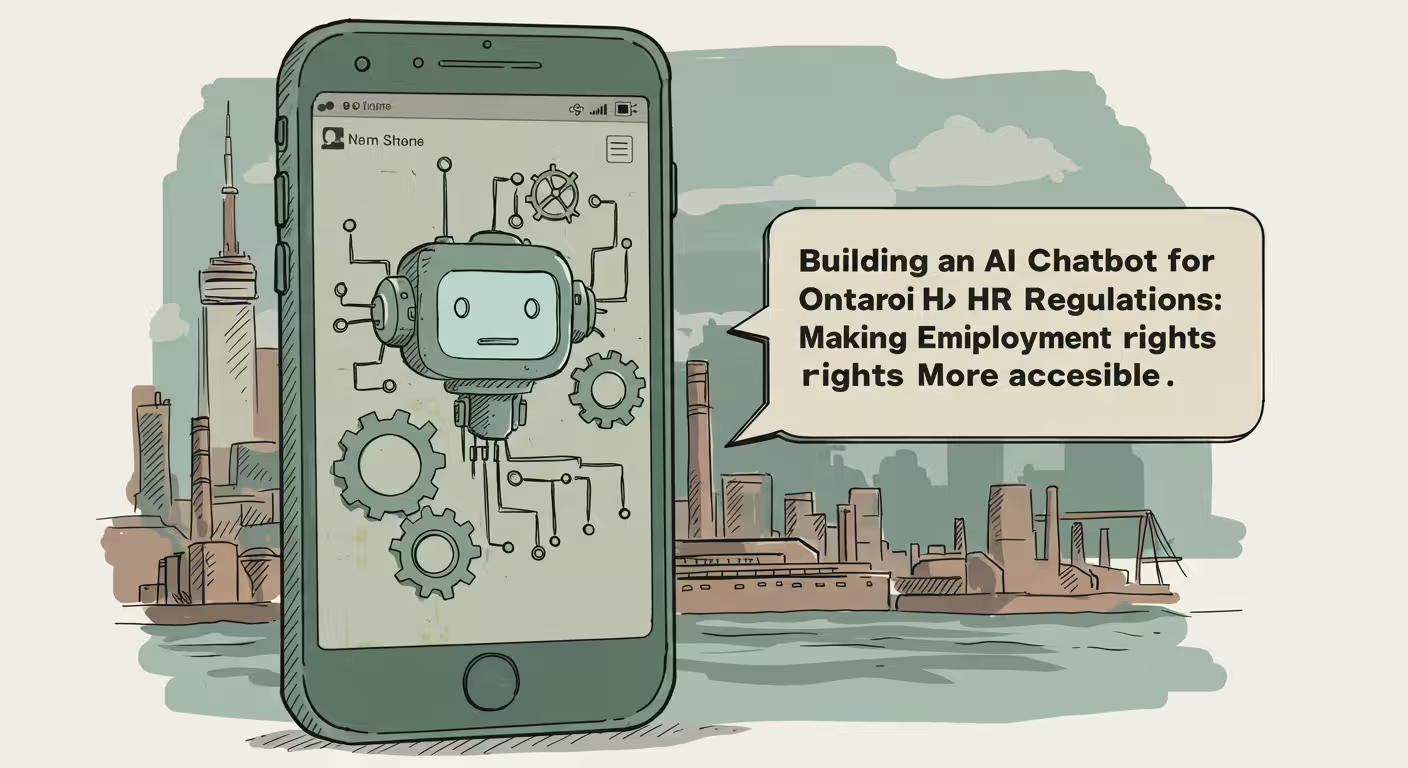Building an AI Chatbot for Ontario HR Regulations: Making Employment Rights More Accessible
In today's complex workplace environment, understanding and navigating employment regulations can be overwhelming for both employees and employers. This challenge is particularly apparent in Ontario, where multiple regulatory frameworks intersect to protect workers' rights and ensure fair employment practices. To address this need, we're exploring the development of an AI-powered chatbot that makes Ontario's employment regulations more accessible and easier to understand.
The Challenge of HR Regulations
Ontario's employment landscape is governed by several key pieces of legislation, primarily the Employment Standards Act (ESA) and the Accessibility for Ontarians with Disabilities Act (AODA). While these regulations provide crucial protections and rights, their complexity can make it difficult for individuals to quickly find and understand the information they need. HR departments often find themselves repeatedly answering the same questions, while employees may feel uncertain about their rights or hesitate to ask questions.
Why a Chatbot Solution?
An AI chatbot presents an ideal solution to these challenges for several reasons:
- Immediate Access: Users can get answers to their questions 24/7, without waiting for HR office hours
- Consistency: The chatbot provides standardized, accurate information based on current regulations
- Privacy: Employees can ask sensitive questions without fear of judgment
- Scalability: The system can handle multiple inquiries simultaneously, reducing the burden on HR staff
Building the Knowledge Base
The foundation of our HR chatbot lies in its carefully structured knowledge base, which incorporates information from:
Employment Standards Act (ESA)
- Minimum wage requirements
- Vacation entitlements
- Leave policies
- Overtime rules
- Termination procedures
Accessibility for Ontarians with Disabilities Act (AODA)
- Workplace accommodation requirements
- Accessibility standards
- Employee rights regarding disabilities
- Compliance deadlines and requirements
Key Features and Functionality
Our chatbot is designed with several essential features to ensure maximum utility:
Natural Language Processing
The system understands questions asked in conversational language, allowing users to phrase their inquiries naturally rather than requiring specific keywords or formats. For example, it can interpret questions like "How much vacation time am I entitled to?" or "What should I do if I need workplace accommodation?"
Quick Access to Specific Information
Users can quickly navigate to specific topics through categorized menus or direct questions. The chatbot provides concise, relevant answers while offering options to delve deeper into specific topics.
Real-World Scenario Handling
The chatbot can process complex, scenario-based questions by breaking them down into their component parts and providing comprehensive responses that consider multiple regulatory requirements.
Accessibility Features
In alignment with AODA requirements, the chatbot interface is designed to be accessible to users with various disabilities, including:
- Screen reader compatibility
- Keyboard navigation support
- Clear, readable text formatting
- Simple, intuitive interface design
Implementation Considerations
Data Security and Privacy
Given the sensitive nature of HR-related inquiries, the chatbot implements robust security measures:
- End-to-end encryption for all conversations
- No storage of personally identifiable information
- Clear privacy policies and data handling procedures
Information Maintenance
To ensure ongoing accuracy and reliability:
- Regular updates to reflect changes in regulations
- Version control for all content
- Audit trails for information updates
- Expert review of responses and content
Integration Capabilities
The chatbot is designed to work seamlessly with existing HR systems and can be integrated with:
- HR management software
- Employee portals
- Company intranets
- Communication platforms
Impact and Benefits
For Employees
- Immediate access to information about their rights
- Confidence in the accuracy of information received
- Privacy when asking sensitive questions
- Better understanding of workplace protections
For Employers
- Reduced burden on HR staff
- Improved compliance with regulations
- Decreased risk of regulatory violations
- Better-informed workforce
For HR Professionals
- More time for complex tasks and strategic initiatives
- Consistent information delivery
- Easy access to regulatory updates
- Better documentation of common issues
Future Development
As we continue to develop and refine the chatbot, several exciting possibilities emerge:
Expanded Coverage
- Integration of additional regulatory frameworks
- Coverage of other Canadian provinces
- Industry-specific guidance and requirements
Enhanced Features
- Predictive question answering
- Customized responses based on industry and company size
- Interactive decision trees for complex scenarios
- Multi-language support
Analytics and Reporting
- Tracking common questions and concerns
- Identifying trending topics
- Measuring usage patterns and effectiveness
- Generating compliance reports
Conclusion
Creating an AI chatbot for Ontario HR regulations represents a significant step forward in making employment rights and regulations more accessible to everyone. By combining advanced technology with carefully curated content, we can help both employees and employers better understand and comply with their rights and obligations under Ontario law.
This solution not only makes information more accessible but also promotes better compliance, reduces the burden on HR departments, and empowers employees to better understand and advocate for their rights. As we continue to develop and refine this tool, we look forward to expanding its capabilities and helping create more informed, equitable workplaces across Ontario.
